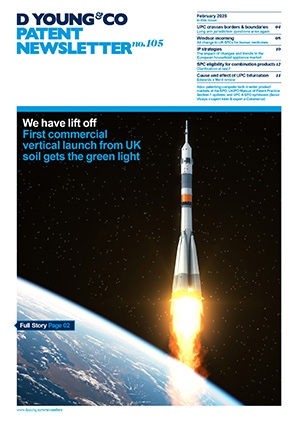A drive for change? Licensing of standard essential patents in the automotive industry
Standards are widely used in the telecoms industry to ensure interoperability of different devices and systems.
By establishing a uniform set of requirements or criteria, standards effectively implement a common language that allows devices from different vendors to communicate with one another, as well as providing security, reliability and quality of service. Examples of standards include 3G, 4G and 5G, the standards associated with mobile telecommunication networks.
Standards are set by Standard-Setting Organisations (SSOs) and can include patented technologies. The patents for such technologies are referred to as standard essential patents (SEPs). Owning an SEP provides significant benefits to the patent owner, as any person implementing the standard without a licence will necessarily infringe the patent.
As the automotive industry evolves in a direction of increased autonomy and connectivity, technology from the telecoms industry is finding its way into automotive vehicles. The need for vehicle-to-vehicle (V2V) connectivity and connectivity between vehicles and their environment (V2X) is increasing, and thus the importance of SEPs in the automotive industry is growing. This is significant for both vehicle manufactures and SEP owners alike.
A particular point of significance is the licensing of SEPs. The licensing of SEPs is already an issue in the telecoms industry that has led to many disputes. In particular, standard-setting organisations require that SEP owners licence their SEPs on fair, reasonable and non-discriminatory terms (FRAND). What constitutes fair and reasonable, however, depends on the circumstances of the situation, which raises an important question - is fair and reasonable in the world of the telecoms necessarily fair and reasonable in the automotive industry?
As it FRANDS: the current landscape in SEP licensing
It is common practice in the automotive industry for the responsibility of obtaining any necessary licences to be in the hands of the upstream supplier, as opposed to the manufacturer of the end product. For this reason, licensing fees in the automotive industry are typically based on the price of the individual parts, rather than the price of the vehicle as a whole.
The owners of SEPs, however, tend to target the manufacturers of the end product, as this has significantly greater value than the constituent parts. This has led to disputes between SEP holders and vehicle manufactures concerning the extent to which SEP holders’ FRAND obligations apply to upstream suppliers in a supply chain.
In a series of disputes between Nokia and Daimler, Daimler argued that Nokia’s licensing was not FRAND as Nokia refused to licence to Daimler’s suppliers. In this case, a number of questions regarding FRAND and SEP licensing were referred to the Court of Justice of the European Union (CJEU). One of the questions posed to the court was whether European SEP owners are obligated to offer a licence to upstream suppliers. The case resulted in a confidential settlement between Nokia and Daimler, and the questions remain unanswered. However, it has been reported that Daimler did in fact end up taking a licence from Nokia, leading some to speculate that this case forecasts a shift towards manufacturers accepting SEP licences in the automotive industry.
Similarly, in the US case Continental v Avanci, Continental accused Avanci of antitrust violations for refusing to license its 4G SEPs to upstream suppliers. The courts found that the case lacked antitrust standing and the suit was dismissed in 2022, perhaps indicating that the US courts are more likely to side with the opinions of SEP owners when it comes to their interpretation of what is fair and reasonable.
Patent pool Avanci provides another possible indication of the direction of travel in the industry. A significant number of the major automotive manufacturers worldwide now hold a licence for the essential patents for 4G, which Avanci provides under a singular licence. Thus, it would appear that the automotive industry is willing to follow the lead of the telecoms industry in relation to SEP licensing, with end manufacturers taking licences for the patented technologies themselves.
That said, many believe that there are likely to be more disputes surrounding the licensing of SEPs in the automotive industry, especially as new technologies and standards begin to emerge. Of particular interest is 5G, for which Avanci has recently launched a licensing programme. Currently, it appears that only a handful of automotive manufacturers hold licences for the essential patents for 5G technologies. It will be interesting to see if other vehicle manufacturers follow suit.
Steering into the future: the EU’s proposal to regulate FRAND licensing
As technology progresses, standards are expanding across a broader range of industries, which could change the landscape of SEPs. 5G is finding its way into more industries than ever before, such as agriculture, education, and healthcare. The demand for SEPs for telecoms technology is no longer confined to a specific industry, thus the calls for certainty and clarity regarding FRAND licensing of SEPs are only getting louder.
On 27 April 2023, the European Commission issued a proposal for a regulation that attempts to settle some of the uncertainty surrounding FRAND licensing and SEPs. The proposal has three main aims:
- making available detailed information on SEPs and existing FRAND terms and conditions in order to facilitate licensing negotiations;
- raising awareness of SEP licensing in the value chain; and
- providing for an alternative dispute resolution mechanism for setting FRAND terms and conditions.
Useful link
Proposal for a Regulation of the European Parliament and of the Council on standard essential patents and amending Regulation (EU)2017/1001, European Commission, 27 April 2023
The proposal involves the creation of a competence centre within the European Union Intellectual Property Office (EUIPO) for essentiality checks of SEPs and FRAND determinations. If accepted, the proposal could dramatically change the landscape of SEPs. However, with a proposal as controversial as this one there are doubts as to whether, and in what form, it will ever be implemented, unless this is accompanied by a corresponding change in law.
Amidst this changing landscape, the intricacies of SEPs and FRAND licensing can be difficult for vehicle manufactures to navigate. It is therefore becoming increasingly important to have an appropriate IP strategy in place.
Useful link
Proposal for a Regulation of the European Parliament and of the Council on standard essential patents and amending Regulation (EU)2017/1001, European Commission, 27 April 2023: dycip.com/eu-commission-2023-0133

